-
 Art of Wellness Acupuncture & Traditional Chinese Medicine (TCM)11704 Wilshire Blvd, Suite 295, Los Angeles, CA, 90025
Art of Wellness Acupuncture & Traditional Chinese Medicine (TCM)11704 Wilshire Blvd, Suite 295, Los Angeles, CA, 90025
myartofwellness@gmail.com310-451-5522 Office Hours
MonClosedTue7:30 am --4 pmWed7:30 am --4 pmThu7:30 am -- 4 pmFri7:30 am -- 4 pmSat7:30 am -- 4 pmSunClosedOur office opens from Tuesdays to Saturdays 7:30 am to 4 pm, will be closed on Memorial day, Independent day, Labor day, Thanksgiving day, Christmas and New year.
-
Recent Posts
- Chinese New Year 2026: Year of the Horse
- Acupuncture and TCM Treatment for Perimenopause Symptoms
- How to Treat Insulin Resistance With Acupuncture and TCM
- How to Treat Metabolic Syndrome With Acupuncture and TCM
- How to Treat Syncope With Acupuncture and TCM
- How to Treat Thoracic Outlet Syndrome With Acupuncture and TCM
- How to Treat Dupuytren’s Contracture With Acupuncture and TCM
- How to Treat Nutcracker Syndrome With Acupuncture and TCM
- How to Treat Rosacea With Acupuncture and TCM
- How to Treat Perioral Dermatitis With Acupuncture and TCM
- Lymphatic Drainage With Acupuncture and TCM
- How to Treat Turf Toe With Acupuncture
- How to Treat Nerve Pain With Acupuncture and TCM
- How to Treat Watery Eyes With Acupuncture and TCM
- How to Treat Ovarian Cysts With Acupuncture and TCM
- How to Treat Dystonia With Acupuncture and TCM
- Sign up to receive news and updates and get my free report:“The Top 10 Reasons to Try Acupuncture”

November 2025 M T W T F S S 1 2 3 4 5 6 7 8 9 10 11 12 13 14 15 16 17 18 19 20 21 22 23 24 25 26 27 28 29 30
Pain
How to Treat Trigeminal Neuralgia With Acupuncture and TCM
By Qineng Tan, L.Ac., Ph.D. & Xiaomei Cai, L.Ac., Ph.D.
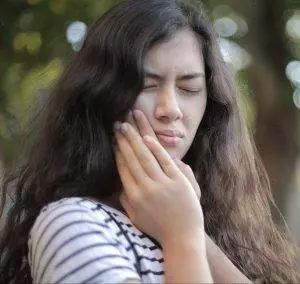
Sudden, sharp, shooting pain in the cheek or jaw that feels like an electric shock? Intense facial pain that lasts for a few seconds or a few minutes, and then goes away? This could be a sign of Trigeminal Neuralgia, a type of nerve pain or neuropathy that affects the nerves in the face. TCM and acupuncture provide a safe, effective trigeminal neuralgia treatment to relieve pain.
Trigeminal neuralgia is a chronic pain disorder associated with the trigeminal nerve, which branches out across the face along each eye, cheek, and the upper and lower jaws. It communicates signals from the face to the brain related to pressure and temperature, and is also involved with the motor action of chewing.
Neuropathy is a general term that refers to any kind of nerve damage or dysfunction that leads to sensations of pain, tingling, or numbness. When there is something wrong with the trigeminal nerve–maybe compression, a lesion on the nerve, or some other problem–then even a light touch, or eating something hot or cold, can cause a very intense pain signal. Trigeminal neuralgia is sometimes called tic douloureux, meaning “painful tic,” because the jolt of pain causes people to wince or grimace. Sometimes people think the pain they’re feeling is dental pain.
The pain of trigeminal neuralgia is often described in terms like: stabbing, burning, and excruciating pain. Sometimes people say it feels like a sudden electric shock. This pain may last only a few seconds, or a few minutes, or it can come and go over the course of hours or days.
Occipital neuralgia is a similar condition, in which the pain is in the back of the head and upper part of the neck. This occurs when the occipital nerves are irritated.
Trigeminal neuralgia pain often flares up on just one side of the face, sometimes isolated to one area. Pain may be around or behind the eye, across the cheek, along the jaw, or inside the mouth. Doctors categorize trigeminal neuralgia into 2 types:
- Type 1 – Typical – facial pain occurs in sporadic, sudden bursts which may last seconds or minutes, or come and go over the course of a few hours. There are periods of times between episodes when there is no pain.
- Types 2 – Atypical – pain in face is constant, with aching, burning sensations present over a widespread area.
Trigeminal neuropathy is similar in some ways to other cranial neuropathy conditions like Bell’s Palsy. In the case of Bell’s palsy, lack of blood flow to the 7th cranial nerve causes a temporary paralysis of the facial muscles and one side of the face to droop. Bell’s Palsy usually goes away after a while, but Trigeminal neuropathy tends to become a chronic condition that gets worse as time goes on.
Acupuncture and TCM are an excellent way to help relieve pain and dysfunction due to all types of neuropathies, including Bell’s Palsy, peripheral neuropathy, sciatica/sciatic nerve pain, piriformis syndrome, radiculopathy (pinched nerve) that can cause neck pain, thoracic or low back pain, or shoulder pain, occipital neuralgia, Morton’s neuroma, and carpal tunnel syndrome.
Acupuncture treatment can help not only to relieve pain caused by nerve disorders, but can actually help to repair damaged nerves, regenerate nerve tissues, and facilitate better communication throughout the nervous system.
Top 10 Trigeminal Neuralgia Triggers

Trigeminal neuralgia pain can occur spontaneously for no apparent reason, but it is often triggered by some sort of touch, movement, or other stimulus. Some common triggers of trigeminal neuralgia pain include:
- Brushing your teeth
- Eating or drinking something hot, cold, or spicy
- Touching your face, leaning your face on your hand
- Shaving facial hair
- Putting on makeup
- Washing your face
- Talking
- Smiling, laughing
- A breeze blowing in your face, wind in your face
- Vibrations from being in a car or airplane, etc.
While the nerve pain caused by trigeminal neuralgia is not life-threatening, and doesn’t really affect your ability to move your face, that doesn’t mean that it doesn’t have an impact on your life. Never knowing when you might suddenly experience severe pain is debilitating. Many people with this type of neuropathy pain can fall into a depression and even begin to experience suicidal thoughts because the thought of having to live with this kind of pain forever is scary.
What Causes Trigeminal Neuralgia?
Trigeminal neuralgia tends to occur more frequently in women, and in people who are over 50. While the exact cause is not always apparent, it usually has to do with a blood vessel creating extra pressure somewhere along the nerve. Sometimes it can be due to a head injury or a tumor in the brain. Multiple sclerosis (MS) can sometimes contribute to trigeminal neuralgia. Sometimes people develop trigeminal neuralgia after a dental procedure.
Trigeminal Neuralgia Treatment Medications
The medications most commonly prescribed for people suffering from trigeminal neuralgia are a class of drugs called anticonvulsants. These medications were originally intended to be used to treat seizures and epilepsy, but they have been found to help some people with neuropathy pain, too. Medicines like Neurontin and Topamax can help disrupt the nerve signals that are causing the pain.
The side effects of these medications can include dizziness, trouble concentrating or remembering things, drowsiness, headaches, vision problems, and nausea.
If a patient has not found relief from trigeminal neuralgia nerve pain with medication, then surgery may be attempted. Doctors may drill into the skull to expose the trigeminal nerve and try to remove blood vessels that may be pressing against the nerve. This is called microvascular decompression (MVD), and is an invasive operation that carries risks and requires a few weeks of recovery time. Not everyone gets pain relief from this procedure, in which case, other options may be tried.
Gamma knife radiosurgery and Radiofrequency lesioning are less invasive procedures that involve applying radiation or heat from an electrode to the trigeminal nerve. The idea is to purposely damage the nerve in order to stop the pain signals. In some cases, this can lead to numbness, or loss of sensation in the face. For some patients, the pain comes back in a matter of years, in which case the surgery can be repeated.
Acupuncture offers an alternative treatment that can relieve pain from trigeminal neuralgia without side effects or risk of permanent nerve damage.
Can Acupuncture Help Trigeminal Neuralgia?

According to the TCM view, different people can suffer from the same type of pain condition or disease but have different underlying problems that are the root cause of the pain. When treating individual patients, an acupuncture practitioner first listens carefully and observes all of a person’s symptoms to determine what kind of internal pathogens or imbalances may be contributing to the pain disorder.
In the case of trigeminal neuralgia, the cause may be related to a blockage in the stomach meridian, which extends into the same facial areas as the trigeminal nerve does. As with other neurological conditions (like Bell’s Palsy and Parkinson’s disease), this blockage may be related to an invasion of wind, either hot or cold, that affects the flow of Qi through the face and head.
In addition to acupuncture treatment, Chinese herbs can help strengthen Qi and help with the rejuvenation of nerve cells. It is also important for a person struggling with trigeminal neuralgia to be cautious of eating or drinking anything that is too hot or too cold. It is also advised that you avoid spicy foods, caffeine, sugar, and processed foods.
Acupuncture works as a natural analgesic to relieve pain, affecting the way that nerve cells transmit pain signals and activating the opioid receptors in the brain.
A case study of a woman who had suffered from trigeminal neuralgia pain for 25 years found that after six weeks of acupuncture treatment, she was free of pain, and was still free of pain six months later.
A review of studies related to trigeminal neuralgia treatments concluded that acupuncture was more effective for pain management of trigeminal neuralgia than medication or surgery, and had fewer adverse effects than either of the other solutions. Over a five year period, acupuncture treatment also cost significantly less money than other treatments.
A study that compared patients who had had trigeminal neuralgia symptoms for an average of 10 years. Half were treated with acupuncture and the other half treated with the anticonvulsant medication Carbamazepine. The acupuncture group reported a higher percentage of effective pain reduction; 95% of the patients found relief, with 30 out of 40 people reporting that their pain was totally resolved.
One study of a dozen patients treated with acupuncture found that all of the participants had reduced pain, to the point that they no longer needed to take medications for trigeminal neuralgia.
Acupuncture Near Me for Trigeminal Neuralgia in the Los Angeles Area
Trigeminal neuralgia can have a serious impact on a person’s quality of life. The pain of this nerve condition can be so extreme that it inspires fear and depression. The standard medical treatments for trigeminal neuralgia don’t work for everyone, and they can come with significant negative side effects. If you or someone you love is suffering from facial pain, please do not hesitate to reach out to us at Art of Wellness Acupuncture. Drs. Tan and Cai have been serving the Westside and Santa Monica since 1995, with expertise in TCM and integrative medicine.
*This article is for education from the perspective of Traditional Chinese Medicine only. The education provided by this article is not approved by FDA to diagnose, prevent, treat and cure human diseases. It should not stop you from consulting with your physician for your medical conditions. Traditional Chinese Medicine is based on Qi, which is an invisible force that usually cannot be observed by modern science. Because science focuses on testing ideas about the natural world with evidence obtained through observation, these aspects of acupuncture can’t be studied by science. Therefore acupuncture and Chinese herbs are often not supported by double-blind, randomized trials, and they are considered alternative medicine therapies in the United States.
How to Treat Rheumatoid Arthritis (RA) With Acupuncture and TCM
By Qineng Tan, L.Ac., Ph.D. & Xiaomei Cai, L.Ac., Ph.D.

Do you have joint pain, swelling or stiffness in the joints, especially finger joint pain or a swollen knee? Maybe you feel that the joint pain is moving to other parts of your body, or flares up sometimes, and then seems to go away. Joint pain accompanied by fever and fatigue may be a sign of Rheumatoid Arthritis (RA), an auto immune disease that causes inflammation and can lead to serious physical disability. Acupuncture and TCM offer a way to help people who suffer from Rheumatoid arthritis, as well as other types of arthritis and autoimmune disorders.
Arthritis is a general term that refers to all kinds of joint pain. Most types of arthritis begin to occur due to aging and the repeated “wear and tear” on the joints of the body that happens as we move through life. Any place in the body where two bones meet is considered a joint, so arthritis pain and inflammation can occur in the large joints of the limbs, causing shoulder pain or hip pain, in the spine, causing back pain, or in the extremities: arthritis in hands and feet. Rheumatoid arthritis most commonly shows up first as arthritis in fingers, hands, and knees.
RA can also be considered a connective tissue disorder, and, as such, bears similarities to Lupus and Ehlers-Danlos Syndrome (EDS).
Rheumatoid arthritis used to be commonly known as “rheumatism,” and now may be referred to as “RA.” It is different from other types of arthritis because the joint pain is caused by immune system problems, not injury or overuse of the joint.
When a person develops an autoimmune disorder, their immune system is mistakenly attacking normal tissues in the body. In the case of RA, an immune response attacks the lining of the joints, a soft tissue membrane called synovium. This creates inflammation and can ultimately begin to cause damage to the bones themselves (osteoporosis). Affected parts of the body can begin to change shape, become weak, and eventually lose their ability to function properly.
In later stages of RA, other body systems can be affected, as well. The joint lining contains blood vessels and nerves, so damage to the synovium can also impact the cardiovascular system and the nervous system. People with RA are at greater risk for developing nerve damage, heart disease, lung disease, and problems with the eyes. People with Rheumatoid arthritis can also be more prone to getting infections like the flu or pneumonia, and certain types of cancers, like lymphoma.
RA can affect your body composition, leading to obesity. Some people may lose weight initially, but it is usually muscle mass that is lost, as RA makes exercise difficult. This means that people can end up with an unhealthy ratio of fat to muscle.
RA is different from osteoarthritis in that it can show up at any time in life. Sometime children develop Juvenile Rheumatoid Arthritis (also known as Juvenile Idiopathic Arthritis). Like RA in adults, this is an autoimmune disorder, and can cause other symptoms like fever and rashes. Some children will grow out of their RA symptoms; others may carry this disorder with them into adulthood.
Most people with RA begin to show signs in their middle age. Women are more likely to have RA than men. As with other autoimmune diseases, medical science has not determined the exact Rheumatoid arthritis causes, but they may be partly genetic, and partly having to do with hormones. Environmental factors may contribute to RA, as can stress and strong emotions. Past illnesses or viral infections, like Epstein Barr virus, can also be a factor.
TCM and acupuncture treatment for Rheumatoid arthritis works on multiple levels. Acupuncture can help to reduce inflammation and stiffness in the joints. TCM treatment with herbs helps to improve and balance immune function. Acupuncture can also relieve emotional symptoms related to stress, fatigue, and depression.
Top 10 Rheumatoid Arthritis Symptoms

For some people the symptoms of Rheumatoid Arthritis may develop slowly over many years; for others, they may start suddenly. People will experience RA symptoms as different sensations, in different parts of the body, which is part of what makes it difficult to diagnose. The most common symptoms of RA include:
- Joint pain that starts in the smaller joints: pain in hands, pain in knees, pain in toes
- Redness and swelling in joints: swollen fingers, swollen knee, hands swollen, ankle swollen
- A sensation of heat or warmth in the joints
- Stiffness first thing in the morning that gets better as the day goes on
- Fatigue, feeling exhausted, tired all the time
- Pain in same joint on both sides, for example, pain in both knees
- Hard lumps under the skin near the painful joints (Rheumatoid nodules)
- Eye pain, dry eyes, blurry vision
- Low grade fever
- Depression, feelings of frustration or hopelessness
People with RA that affects their hips, knees, or ankles may begin to walk with a limp. Diminished function of the joints may cause a person to lose their grip strength and coordination. Over time, the hands and fingers or feet and toes may begin to become disfigured, as loss of soft tissue and bone changes their shape.
People with Rheumatoid arthritis are also more likely to experience Raynaud’s syndrome, a condition that constricts blood vessels in the fingers and/or toes when exposed to cold, causing numbness and a whitening of the skin as blood circulation slows.
In some cases, RA can also cause an enlarged spleen.
Rheumatoid Arthritis Treatment
At this time, treatments for rheumatoid arthritis are mainly directed towards relieving pain, reducing chronic inflammation, and slowing down the progression of this inflammatory disease.
A primary care physician will probably refer patients to a rheumatologist for rheumatoid arthritis diagnosis and treatment. Rheumatologists specialize in joint diseases and all types of arthritis, so they treat joint pain related to conditions like osteoarthritis, psoriatic arthritis, reactive arthritis, musculoskeletal pain related to fibromyalgia, tendonitis, and autoimmune diseases like lupus.
Typical medical options for RA include NSAIDs and corticosteroids, to quickly reduce pain inflammation. Anti-rheumatic drugs, known as DMARDS, have both anti-inflammatory and immunosuppressive properties. They work more slowly, but if started soon after diagnosis, they can help to prevent more damage to joint tissues, and relieve RA symptoms.
Unfortunately, all of these medications carry side effects. In the case of DMARDS, some patients experience gastric upset, headaches, and fatigue. They can also increase chances of infections, which is already a problem for people with RA.
Biologics are another type of injectable medication used to help relieve chronic inflammation by suppressing certain immune responses. These can also put people at higher risk for infections and certain cancers.
Acupuncture and TCM offer a way to reduce inflammation and pain without side effects.
Can Acupuncture Help Rheumatoid Arthritis?
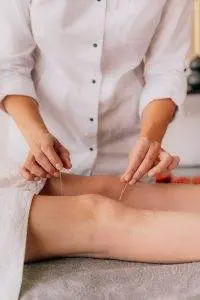
TCM has its own way of categorizing diseases. According to TCM theory, Rheumatoid arthritis falls under the category of “Bi” disorders. In TCM, environmental factors like cold, wind, heat, and dampness can invade the body and affect the organs, ultimately causing organ systems to malfunction. When they manifest in the body, pathogenic factors like cold and dampness can slow down or block the flow of blood and Qi (life force energy) through the body.
“Bi” conditions involve obstructions of Qi and blood that then lead to stiffness, swelling, soreness, redness, and heat in the joints. The famous TCM medical text known as “The Yellow Emperor’s Classic of Internal Medicine,” which was written a few centuries B.C., recorded identification of Bi syndromes. Bi syndromes can certainly be in part related to outside environmental conditions, such as living in a cold, wet, windy place. They can also be related to a weakness of protective Qi that would translate into conventional terms as being a weakened immune system. Thus, Bi syndromes include rheumatoid arthritis, other types of arthritis, and other painful joint conditions like gout, lupus, and neuralgia.
A review of studies conducted on patients who received acupuncture treatment for Rheumatoid arthritis concluded that TCM is a good method for helping patients with this type of condition. TCM acknowledges that within one disease, different people may have very different symptoms, due to their genetics, or what we sometimes call “constitution.” One person will show hot symptoms like redness, swelling, and fever. Another person may find that their joint pain is particularly affected by cold, wet weather. An acupuncturist near me will look and listen to see what sort of pattern has developed, and will treat each individual accordingly with acupuncture points for joint pain.
Acupuncture Near Me for Rheumatoid Arthritis in Greater Los Angeles
TCM offers a framework in which we are able to see autoimmune disease as a collection of issues that can all be addressed in concert. With acupuncture and herbs, we can help relieve pain and inflammation, while also building back up of the systems of the body that have become weak. At Art of Wellness in West LA, we have many years of experience helping people manage autoimmune disorders and get relief from joint pain.
*This article is for education from the perspective of Traditional Chinese Medicine only. The education provided by this article is not approved by FDA to diagnose, prevent, treat and cure human diseases. It should not stop you from consulting with your physician for your medical conditions. Traditional Chinese Medicine is based on Qi, which is an invisible force that usually cannot be observed by modern science. Because science focuses on testing ideas about the natural world with evidence obtained through observation, these aspects of acupuncture can’t be studied by science. Therefore acupuncture and Chinese herbs are often not supported by double-blind, randomized trials, and they are considered alternative medicine therapies in the United States.
How to Treat Celiac Disease With Acupuncture and TCM
By Qineng Tan, L.Ac., Ph.D. & Xiaomei Cai, L.Ac., Ph.D.

Do you have digestive problems like a bloated stomach, diarrhea, and abdominal pain? Unintentional weight loss, fatigue, skin rashes? These can all be signs of Celiac disease. Different from food allergies, Celiac is a serious autoimmune disorder that can lead to malnutrition and other debilitating health problems. TCM herbs and acupuncture treatment offer a good alternative way of managing Celiac disease and gluten intolerance symptoms.
In recent years, you have probably heard a lot of people saying they are switching to a gluten free diet because they have a gluten allergy or gluten intolerance. Sometimes people may just be trying to see if they feel better when they cut out wheat products, or they are going on a low carb diet to help them lose weight. Other people may be experiencing symptoms like diarrhea and nausea and hope that going on an IBS diet will help.
What is gluten? Gluten is a protein that is present in some grains, including wheat, barley, and rye. When a person has Celiac disease, gluten is perceived by the immune system as a dangerous foreign substance, triggering an immune response. Antibodies (white blood cells) are produced as a reaction to gluten entering the body, and the antibodies end up causing inflammation and damage to the inside of the intestinal tract.
This damage to the small intestine is called villous atrophy, and this is what causes inflammation and malabsorption of nutrients, leading to the myriad symptoms of Celiac. Celiac symptoms vary widely, and can include both digestive problems, and other conditions, like anemia, that stem from the lack of proper nourishment to the body.

There is such a thing as a true wheat allergy, which for some people causes respiratory problems like difficulty breathing and nasal congestion, and other allergy symptoms like swelling and itching around the mouth and throat, hives or other itchy skin rashes, and headaches. Wheat allergies are a response to chemical compounds in wheat, which is found in a wide variety of food products. In some cases, exposure to wheat can cause anaphylaxis, which requires emergency medical attention because it can involve trouble breathing and swallowing, chest tightening, throat swelling, dizziness, and fainting.
Some doctors now recognize gluten intolerance or non-celiac gluten sensitivity as a separate condition from Celiac disease. For some people, gluten causes an immune response and symptoms, but not the same kind of damage to the intestines that Celiac does. If gluten intolerance is suspected, then following a gluten free diet for a period of time and noticing if symptoms clear up is usually the recommended course of action.
Celiac disease tends to run in families, and so is considered to be passed genetically. People can begin to show signs of Celiac at any age. It is estimated that at least 1% of the population has Celiac disease, but that number may be significantly higher, as it is still not a very well understood condition. Many people who have Celiac disease are unaware of it, or have been misdiagnosed with other conditions. Researchers believe that the incidence of Celiac disease is increasing worldwide, probably due to some environmental factors.
Acupuncture and TCM herbs provide a holistic way to treat Celiac disease, relieving the painful symptoms and providing detailed guidance for lifestyle and dietary changes that can help people manage Celiac and gluten intolerance. Nutrition is considered to be one of the primary branches of TCM, along with acupuncture and herbs. A TCM practitioner will be able to give you dietary recommendations far beyond just telling you to eat gluten free foods.
Top 10 Celiac Disease Symptoms
People can experience a variety of gluten intolerance symptoms, including digestive problems, allergy symptoms like skin rash, and other symptoms related to nutritional deficiency, like anemia and weight loss. Signs of gluten intolerance may be different in children, who are more susceptible to malnourishment that can lead to a failure to thrive.
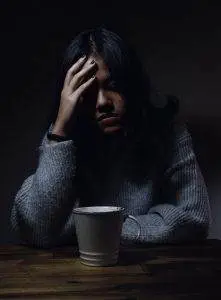
Celiac symptoms include:
- Fatigue
- Weight loss
- Diarrhea, pale colored stools, foul-smelling, fatty, greasy stool
- Abdominal bloating, bloated stomach, gas, stomach pain, abdominal pain
- Nausea, vomiting
- Constipation
- Headache, headaches, migraines, migraine headaches
- Skin rash, mouth ulcers, mouth sores, canker sores
- Neuropathy, numbness or tingling in hands and feet, problems with balance, joint pain
- Cognitive problems, foggy head, difficulty concentrating
Celiac can lead to SIBO, anemia, iron deficiency, loss of bone density (osteoporosis), weak bones, soft bones, bone loss (osteopenia), joint pain, or arthritis. People can also have liver problems, including fatty liver.
Dermatitis herpetiformis is a specific type of skin rash that causes itching and blisters to appear, primarily on the knees, elbows, torso, top of the head, and buttocks.
Women may find that celiac disease affects their hormones, menstrual periods, and can have an impact on fertility, even causing recurrent miscarriages.
Celiac disease can also contribute to infertility and low sperm count in men.
When a child develops celiac disease, the inability to absorb nutrients from food can cause problems with normal growth, such as short stature, delayed puberty, and damage to tooth enamel. Developmental disorders and behavioral issues can also be related to celiac, like ADD/ADHD and irritability.
In extreme cases, Celiac can cause seizures.
Celiac Disease Diagnosis and Treatment
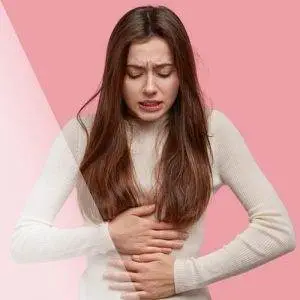
Going through the process of being diagnosed with Celiac disease or gluten intolerance is quite complicated and involves multiple tests. From the medical standpoint, it is best that you do not eliminate gluten or change your diet before the testing, so that it can accurately show how gluten is affecting your immune system and your intestines.
First, you will probably have a blood test that looks for certain antibodies that would indicate an autoimmune reaction to gluten. Some people may test negative for antibodies, and yet still have Celiac, though, so this blood testing is not enough to be conclusive. Genetic testing may be done, which looks for specific antigens to rule out Celiac. If testing shows that a person has antibodies, and they also have a specific type of skin rash (dermatitis herpetiformis), that is usually enough for a doctor to give an official diagnosis of Celiac disease.
Endoscopy is an imaging test which uses a little camera to see if there is damage to the intestinal lining. They will also take some tissue samples from the lining of the intestine to check for inflammation and damage. The results of these tests may lead to a formal Celiac diagnosis. People will often need to have an endoscopy to find out if they have Celiac disease, and then possibly repeated endoscopies to see if the inflammation is getting better or worse.
Sometimes people will try figuring out what is going on themselves with a food sensitivity test or food intolerance test kit that you can do at home and send in for results. Food allergy testing may give you some information as to whether you have a reaction to a specific allergen (egg allergy, milk allergy, peanut allergy, shellfish allergy) or have a food sensitivity, but they cannot tell you if you really have Celiac disease or gut inflammation.
Going through the diagnostic process for autoimmune diseases like Celiac disease can be exhausting in and of itself. Meanwhile, you aren’t yet getting treatment for your symptoms. The only treatment available in conventional medicine for Celiac disease really is to follow a gluten free diet. Most doctors are not able to do much beyond give you a list of foods you shouldn’t eat, or refer you to a dietitian.
TCM has the ability to provide more comprehensive care for people with Celiac disease, and many other autoimmune conditions. Acupuncturists are highly trained professionals when it comes to offering patients detailed guidance for following an effective Celiac disease diet.
Can Acupuncture Help Celiac Disease and Gluten Intolerance?

TCM has more to offer than just acupuncture treatment and herbal medicine. Nutrition is one of core competencies every TCM practitioner must master.
Acupuncture treatment can help relieve digestive symptoms like abdominal pain and bloating, and also have a positive impact on the system malfunctioning that leads to autoimmune reactions. With Chinese herbs, we are able to get very potent nutrients into the body that wouldn’t normally come from food. For people with Celiac, or other problems like food allergies or sensitivities, malnutrition due to malabsorption is a real problem.
A TCM nutrition approach can help restore the body’s health with foods and herbs better than a simple elimination diet for Celiac disease can. An acupuncturist listens carefully to the particular symptoms and sensations you describe. These provide important clues as to which organ systems are involved, and where yin and yang are out of balance. Then TCM provides a framework for tailoring the treatment and food plan for Celiac disease to each individual’s needs.
According to TCM theory, the stomach and spleen are responsible for digesting food. Celiac disease symptoms are, according to a typical TCM diagnosis, related to a spleen deficiency. When Qi in the spleen is weak, the body is not getting the nutrients it needs. Building up the strength of the spleen will often be the focus of the acupuncture portion of the treatment. Herbs and specific nourishing foods will be recommended, which will help anemia and soothe the digestive tract.
Acupuncture Near Me For Celiac Disease, West Los Angeles
Autoimmune diseases like Celiac disease can be especially frustrating because they seem to take over your whole life. Not only physical health, but mental health is compromised. Treatment options are limited. Fortunately, TCM offers a complementary form of medicine that is able to provide multi-faceted care for autoimmune disorders like Celiac, including: Crohn’s disease, Type 1 diabetes, hyperthyroidism, Lupus, rheumatoid arthritis, fibromyalgia, and multiple sclerosis (MS). Acupuncture treatment can help reduce feelings of anxiety and depression as you learn to manage your illness.
If you or someone you know has been suffering from digestive issues, and you suspect it may have something to do with gluten intolerance or Celiac disease, be prepared to go through testing, but also give some thought to adding a TCM provider to your health care team. At Art of Wellness, we have over 35 years of providing excellent care through TCM treatments, including expert nutrition services. It is like getting an acupuncturist and dietitian in one.
*This article is for education from the perspective of Traditional Chinese Medicine only. The education provided by this article is not approved by FDA to diagnose, prevent, treat and cure human diseases. It should not stop you from consulting with your physician for your medical conditions. Traditional Chinese Medicine is based on Qi, which is an invisible force that usually cannot be observed by modern science. Because science focuses on testing ideas about the natural world with evidence obtained through observation, these aspects of acupuncture can’t be studied by science. Therefore acupuncture and Chinese herbs are often not supported by double-blind, randomized trials, and they are considered alternative medicine therapies in the United States.
How to Treat Tennis Elbow With Acupuncture and TCM
By Qineng Tan, L.Ac., Ph.D. & Xiaomei Cai, L.Ac., Ph.D.

Pain in outer elbow or burning sensation in forearm? Tennis Elbow, also called lateral epicondylitis, is a pain condition caused by overuse or repetitive movements of the arm and wrist. Acupuncture and TCM can provide help with healing the muscles and tendons of the elbow and providing elbow pain relief of tennis elbow, golfer’s elbow, or tendonitis, so you can get back to your usual activities.
“Tennis elbow” gets its name from the fact that many people get this type of repetitive use injury from playing tennis and other sports that involve holding a racquet. But tennis elbow doesn’t only occur in athletes; it’s also common among people who have to perform repetitive movements that tax the muscles and tendons of the elbow, forearm, wrist, and hand and involve gripping an object, such as: painting, hammering and sawing (construction workers), cutting or chopping (cooks, chefs, butchers), using a wrench (plumbers), or working on an assembly line.
Tennis elbow is a kind of tendonitis, or inflammation of the soft tissues of the forearm. Tendonitis occurs when the soft tissues that attach muscles to bones sustain microtears and become inflamed. The major muscle involved in movements where the wrist and hand are gripping an object while the elbow is extending, or straightening, is the extensor carpi radialis brevis (ECRB) muscle. The ECRB muscle experiences friction as it moves over the bumpy joining of three bones in the elbow joint. Over time, and with overuse, the tendons that attach the ECRB to the bones can become torn and/or inflamed.
Tennis elbow pain is usually centered right in the outer side of the elbow, and just below the joint, but it can also radiate further down the arm and into the wrist. There might be a burning sensation in the muscle on the outer forearm. Pain and weakness in the elbow and wrist can make it difficult to perform regular actions like holding a cup or using a computer mouse.
Golfer’s elbow is a similar condition in that it is also an overuse injury that causes weakness and pain in the forearm. The difference is that with golfer’s elbow, also known as medial epicondylitis, the inflammation and microtearing occur in the muscles and tendons involved in flexing the arm rather than extending it, or bending the wrist inward towards the palm with a lot of force or speed. These are located on the inner part of the elbow and forearm. This type of repetitive use condition can be the result of swinging a golf club, throwing a baseball, hitting a forceful spin serve in tennis, but also such activities as shovelling, using a heavy tool like an axe or chainsaw, or even just carrying a heavy suitcase with your hand and wrist wrapped around the handle.
Tennis elbow pain can be resolved with rest, but for many people, complete rest is not a feasible or desirable option. Acupuncture treatment has been shown to help provide significant pain relief for tennis elbow. Acupuncture treatment can help to reduce inflammation and improve blood flow to injured areas to aid and speed healing of various types of tendonitis.
Top 5 Symptoms of Tennis Elbow

Signs of tennis elbow usually develop slowly over time and are not caused by any obvious single injury.
- Elbow pain or pain on the outside of the forearm, burning sensation in the outer part of elbow, stiff elbow
- Pain that radiates down to the wrist, wrist pain, stiff wrist
- Stiffness of the elbow, especially first thing in the morning
- Weak grip strength, reduced grip strength
- More severe pain when gripping an object, like a mug or racquet
Symptoms of golfer’s elbow are similar, except that the pain is located on the inner side of the elbow or forearm, as opposed to the outer side. Pain is more likely to radiate to the fourth and fifth fingers (ring finger and pinky finger) than to the wrist. You may feel pain when making a fist.
Wrist pain, tingling in the fingers, and weak grip strength can also be signs of carpal tunnel syndrome.
Medical Treatment for Tennis Elbow
The standard treatment for Tennis Elbow begins with rest, icing, and non-steroidal anti-inflammatory medications (NSAIDs like Ibuprofen or Acetaminophen) to reduce pain and swelling. If the pain persists, or perhaps if a person is not able to avoid the activities that are causing the inflammation, doctors may recommend wearing a brace and may administer steroid injections.
Surgical treatment for tennis elbow is relatively rare and only recommended in cases where rest and pain management medications are not working. An arthroscopic procedure to remove damaged and scarred tissue can help repair the muscles and tendons, but there is usually a long recovery time after the surgery.
A newer form of treatment for chronic tendon pain and inflammation is the F.A.S.T. procedure (Focused Aspiration of Scar Tissue). This is a less invasive procedure that uses ultrasound imaging and ultrasonic technology to remove tiny bits of damaged tissue without any incisions. Recovery time after this procedure is much shorter than with regular tennis elbow surgery.
While pharmacological treatment for pain may help to reduce immediate suffering, medications like NSAIDs and steroid injections come with significant side effects, even if they aren’t immediately apparent. Using these kinds of medications long-term to alleviate chronic pain can take their toll, sometimes causing gastrointestinal distress, weight gain, sleep problems, and other side effects that have a negative impact on overall health. Acupuncture treatment can act as an analgesic to relieve pain without any negative side effects. In fact, the side effects of acupuncture treatment are usually beneficial, including increased circulation, immune function, and stress relief.
Can Acupuncture Treat Tennis Elbow?
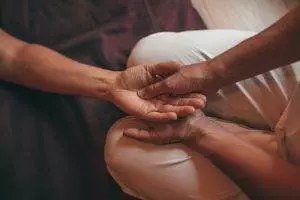
The treatment of chronic pain and inflammation with TCM goes back for many centuries. We use acupuncture and other methods to help relieve pain and reduce inflammation related to shoulder pain, knee pain, hip pain, neck pain, sprained ankle, and foot pain. TCM uses a variety of modalities to treat orthopedic pain conditions, including: acupuncture treatment, electro-acupuncture, moxibustion, cupping, Tui Na massage, exercise, and Chinese herbs in formulations for both internal (tea or pills) and external (pain patches) use. This multi-pronged approach can be very effective for reducing pain in the short term, while helping tissues to heal over time.
A controlled study in which patients suffering from lateral epicondylitis were divided into three groups and treated with either massage or acupuncture, or a combination of both, showed that patients who received the combination treatment experienced, for the most part, a complete recovery after twenty sessions.
Another controlled study that compared people suffering from chronic tennis elbow who were treated with real acupuncture versus sham acupuncture showed that at both the two week mark and the two month mark, people who had received acupuncture reported less pain and improved function of the arm joints.
Exercises and Pressure Points for Tennis Elbow Pain Prevention

If you are already experiencing tennis elbow pain or signs of golfer’s elbow, you may need to take some time off from sports or make accommodations to your work in order to rest the muscles and tendons of the forearm. Resting the arm is important for allowing inflammation to go down. Once you’re able to start exercising again, try these home remedies for tennis elbow that will help to prevent tendon problems in the future:
- To prevent repetitive stress conditions like tennis elbow and golfer’s elbow when playing sports, be sure to always warm up before playing and cool down afterwards. Practice your form, with a trainer if warranted, so that you know your technique is good and not contributing to pain or injury. Check your sports equipment regularly to make sure everything is in good condition and the right size and balance for you.
- Pressure points for tennis elbow: If you are experiencing pain in the elbow and forearm, you might try using this acupressure point to help tennis elbow pain: LI11 (Large Intestine Meridian 11) – located right in the crevice of the elbow crease, applying pressure to this point can help move Qi and blood through the joint and bring relief from tennis elbow pain. This point is also helpful for clearing heat and cooling you down after exercise, so it’s a good one to use right after a game or when you finish work.
- Exercises for Tennis Elbow – practicing gentle exercises that strengthen the muscles of the wrist and forearm can help prevent pain and tissue damage. Using light dumbbells or a flex bar can help with grip strength.
Acupuncture Near Me for Tennis Elbow on the Westside of Los Angeles
Whether you are an avid tennis player, or someone who works hard doing physical labor, elbow pain from lateral epicondylitis can really cramp your style. Athletes and active people of all ages need to take care of their bodies appropriately so as to avoid injuries that can lead to chronic pain. Adding acupuncture to your health regimen is a great way of providing basic maintenance for your body. Acupuncture treatment, therapeutic massage, and a good nutrition program can all help you keep your joints moving smoothly, without pain. At Art of Wellness, we have over 30 years of experience in helping to relieve orthopedic and musculoskeletal pain conditions.
*This article is for education from the perspective of Traditional Chinese Medicine only. The education provided by this article is not approved by FDA to diagnose, prevent, treat and cure human diseases. It should not stop you from consulting with your physician for your medical conditions. Traditional Chinese Medicine is based on Qi, which is an invisible force that usually cannot be observed by modern science. Because science focuses on testing ideas about the natural world with evidence obtained through observation, these aspects of acupuncture can’t be studied by science. Therefore acupuncture and Chinese herbs are often not supported by double-blind, randomized trials, and they are considered alternative medicine therapies in the United States.
How to Treat Toothaches With Acupuncture and TCM
By Qineng Tan, L.Ac., Ph.D. & Xiaomei Cai, L.Ac., Ph.D.
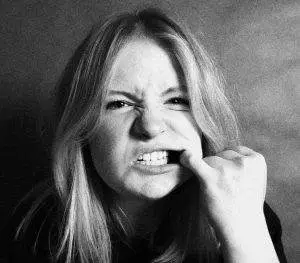
Sharp tooth pain, toothache, or throbbing pain in teeth usually means you need to see the dentist. The pain of dental work often necessitates the use of anesthetics, while post-operative pain from dental surgery is usually treated with over the counter pain medications or opioid painkillers. Acupuncture offers an alternative way of dealing with dental pain and can also relieve the dental anxiety many people experience when they have to have dental work done.
Oral pain makes it hard to eat, hard to talk, hard to even think straight. Mouth pain felt in relation to problems with the teeth, or a hurting tooth, is often nerve pain that may be sharp in one place, or radiate to other parts of your face and head. Acupuncture acts upon the neurotransmitters that carry signals between parts of the body and the brain, helping to block pain sensations and relieving tooth pain.
Different types of mouth pain, not necessarily related to dental problems or the teeth, can also be alleviated by acupuncture, including TMJ jaw pain, clicking or locking of the jaw, tension from grinding teeth, and dry mouth (xerostomia). Myofascial pain, pain in the muscles of the face, and migraines that cause pain in the neck and side of the head can also be helped with acupuncture treatment.
Acupuncture and herbs do not replace the need for regular dental visits or necessary dental procedures. However, TCM methods, used in conjunction with good oral hygiene, can help to promote the development of strong teeth in children, and the maintenance of healthy teeth and gums in adults. TCM treatments help improve immune function, as well, which can help prevent mouth infections.
While dentists have a variety of anesthetics they can use to help reduce pain during dental procedures, many people find the injection of anesthetic to be painful and anxiety-inducing in and of itself. There are definitely downsides to the pain relief offered during dental visits, so much so that many people avoid going to the dentist, or at the very least wish there was some alternative form of anesthesia. Recently, there is growing interest and research to show that acupuncture can be an effective means of providing pain relief before, during, and after dental procedures.
It is estimated that up to 30% of people report feeling dental anxiety, while about 10% of patients experience dental phobia. Acupuncture has been shown to help produce a clinically significant decrease in feelings of anxiety or fear of going to the dentist.
Managing Dental Pain
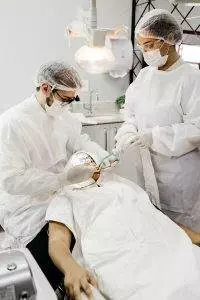
It is common to experience pain while you are waiting to get into the dentist for a toothache caused by a broken filling or because a crown has fallen out. Most dental pain is usually managed with non-steroidal inflammatory drugs (NSAIDs), also known as OTC pain medications like ibuprofen and acetaminophen. However, some people cannot tolerate the regular use of these medicines, as they can cause damage to the lining of the stomach.
Different types of anesthesia used during dental work include:
- local anesthetics (lidocaine, articaine, etc.), which numb the area where a tooth is being worked on
- sedation (nitrous oxide gas, Valium, Versed, etc.), which helps relax the patient
- general anesthesia, which means a patient is rendered unconscious for the duration of the dental procedure
Pain after oral surgery is most often treated with over the counter analgesics like ibuprofen or acetaminophen, but severe dental pain may be treated with opioid painkillers. Dentists in the U.S. are far more likely to prescribe opioid pain medications than they do in other countries. Dentists are also more likely to prescribe long-acting opioids, and to prescribe opioids for a longer period of time. The growing numbers of people addicted to opioids in America is largely due to over-prescription of these drugs. TCM methods like acupuncture can relieve a toothache and reduce post-operative pain and bleeding without side effects or risk of dependence.
Can Acupuncture Help Tooth Pain?
Acupuncture treatment has an analgesic effect, reducing pain and inflammation of all kinds. Acupuncture not only offers natural pain relief for toothache, but can also help reduce bleeding during dental procedures such as tooth extractions.
A controlled study that compared two groups of patients have teeth extracted, one group treated with articaine hydrochloride injections and the other groups treated with acupuncture needles, found that pain relief was comparable between the anesthesia and acupuncture groups, while bleeding was less amongst those patients given acupuncture.
In addition to helping with pain and bleeding during and after a dental procedure, many people find it helpful to come in and have an acupuncture treatment just prior to their dental appointment in order to help alleviate anxiety. Acupuncture may also help to reduce a person’s gag reflex, which can be easily triggered during fittings for orthodontic devices, or impressions.
With acupuncture treatment, we can also effectively treat dental anxiety, allowing for patients to feel more relaxed going into their dental appointment and feel less pain during and after a dental procedure.
Top 3 Pressure Points to Help Tooth Pain
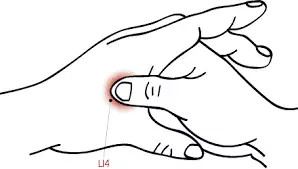
Acupressure has been shown to help reduce anxiety, gag reflex, and the need for dental injections for pain during fittings for prosthetics. Specific points on the head and face, in particular, can help relieve toothache and swelling.
If you are experiencing acute tooth pain, plan to see your dentist as soon as possible. In the meantime, using these acupressure points for toothaches can help you stay calm and alleviate the pain until you can get treatment.
- ST6, Stomach Meridian Point 6, is located in the cheek, equidistant between the corner of the mouth and the earlobe. Apply pressure to the jaw muscle here to help relieve toothache and jaw pain.
- SI18, Small Intestine Meridian Point 18, is right in the cheek hollow, perpendicular to the corner of the eye and outside of the nose. Apply pressure to this point to help relieve tooth pain and swollen gums.
- LI4, Large Intestine Meridian Point 4, is located in the webbing between the thumb and index finger. Squeeze with firm pressure here. Often used to relieve headaches, but this point helps tooth pain, as well.
Acupuncture Near Me for Tooth Pain on the Westside of Los Angeles
No one likes going to the dentist. However, if you have a hurting tooth but you’ve been avoiding the dentist out of fear, or if you know you have to have some major work done, and you are dreading it, please consider scheduling an acupuncture appointment before your next dentist appointment. Discover for yourself how acupuncture can help relieve dental anxiety and post-procedural dental pain. You may find you feel much more relaxed about the whole thing, and herbs and acupuncture can help staunch bleeding and speed recovery after dental work.
*This article is for education from the perspective of Traditional Chinese Medicine only. The education provided by this article is not approved by FDA to diagnose, prevent, treat and cure human diseases. It should not stop you from consulting with your physician for your medical conditions. Traditional Chinese Medicine is based on Qi, which is an invisible force that usually cannot be observed by modern science. Because science focuses on testing ideas about the natural world with evidence obtained through observation, these aspects of acupuncture can’t be studied by science. Therefore acupuncture and Chinese herbs are often not supported by double-blind, randomized trials, and they are considered alternative medicine therapies in the United States.